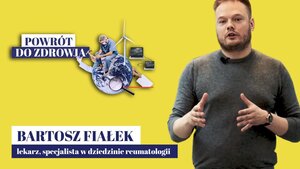Speakers' Corner – Health Recovery
As part of the "Health Recovery" area, we listened to Bartosz Fiałek's speech under the title Level Higher, as well as the discussion of Renata Kaznowska and Adam Wieczorek titled Centrally or Locally.
In his statement, Dr Bartosz Fiałek touched on three pillars that, he believes, were very important for the condition of the Polish public health: what can we do to make the public health care system function better; what can we, the citizens, do to improve our health; COVID-19 and vaccines.
According to Dr Fiałek, the public health care system is plagued by two problems - extreme underfunding and shortages of staff - doctors and nurses. Because of disproportionate to actual needs funding, we have a situation where there are rationing, limits, and, consequently, queues. Access to health care services is greatly limited, but topping up money to the health care system that is poorly organized will not allow us to use that money properly.
The medical doctor points to the need for reform, but in reality to a paradigm shift from inpatient treatment (hospitalization) to outpatient treatment, as in the Scandinavian countries, for example. In Poland, twice as many contracted medical services are carried out in a hospital instead of a laboratory. Diagnostics is possible to perform in fact outside a hospital.
The number of doctors and nurses is inadequate, due to two reasons – inadequate salaries and very poor workplace ergonomics.
The pandemic has strained our already not very good health. Patients who now go to a doctor are at a more advanced stage of illness than it was the case before the pandemic. This is a result of even greater restrictions on access to public health care.
Prior to the pandemic, the OECD and the EC showed reports on what various types of health indicators looked like in a given country. As regards those significant in terms of epidemiology, Poland performed very badly and often below the European average. Those two indicators were unsatisfied health needs of Poles and the number of deaths that could have been prevented once timely and effective medical intervention had been secured. COVID further exacerbated this gap between Poland and other countries and worsened the values of those indicators.
We finally have a tool that will allow us to recover from the COVID-19 epidemic, and that tool is a vaccine. The history of vaccines began in the late 18th century with the development of smallpox vaccines. Today, this disease is unknown to most of us because it no longer exists.
Will COVID-19 vaccines allow us to eradicate this disease entity? We don't know that yet. What we do know for today is that the vaccines for COVID-19 are safe, effective and reduce the risk of catching a new coronavirus.
Once we have defeated this pandemic, we must not forget what it has left us with - a disease entity called long COVID, which is a complication caused by outbreaks of coronavirus. - Let us not underestimate these symptoms. Postcovid rehabilitation clinics are being established. And it is they we should turn to after having survived coronavirus whenever we suffer prolonged symptoms of this disease or see the recurrence of symptoms of the disease despite the fact that we are healthy. The symptoms vary: chronic fatigue, headaches, neurological and psychiatric disorders, muscle pain, joint pain, sleep disorders, hair loss, or gastrointestinal symptoms -Bartosz Fiałek said.
A healthy lifestyle means proper nutrition and physical activity. But equally important are human relations, or active and passive recreation. Joy, contentment are important. Personal hygiene also reduces the occurrence of various diseases. Many of these principles can reduce the risk of emerging various diseases.
We invite you to see Bartosz Fiałek’s article titled Level Up.

_ _ _ _ _
According to Warsaw deputy mayor Renata Kaznowska, in recent times the Polish health care system has simply abdicated. The year of the pandemic has exposed so many weaknesses in the system that the question is whether we are able to change this effectively and in what time frame.
- We all think that we are young and healthy. And when we get sick, very often we are seriously sick. And unfortunately we end up in long queues, waiting for diagnostics, hospitalization, surgery, rehabilitation. There is a lot to do - Renata Kaznowska said.
Adam Wieczorek, deputy mayor of Łódź, noted that in Poland we paid a health care contribution, but there was no feeling that we could expect anything specific in return. In his opinion, we stopped expecting anything from the health care system. However, the contributed money was big.
- In my opinion, today the biggest problem is the lack of medical staff. On the part of the government, I don't see any reflection on how to solve this issue – Adam Wieczorek remarked.
According to Renata Kaznowska, the government's plan is that all the local government hospitals, over 300 in Poland, are to be subject to some centralization. - I believe that we, local government officials, are able to take care of our citizens better. We know what they need. Centralization of hospital management is a road to nowhere. After the announced reform there will be only left a hospital development agency with successive CEOs and really not much more. The health care reform that the ministry is talking about does not cover the problem of medical staff. The number of nurses and doctors is declining, and there is no idea how to educate new personnel and how to retain people who are currently working - the deputy mayor of Warsaw said.
Adam Wieczorek said that each time something bad or good happens in a local government hospital, the resident knows whom to write to. When the national level takes over such a hospital, the resident will feel powerless in a clash with a huge apparatus. - Locally, we propose solutions, such as the in vitro program. The problem of infertility is so widespread in Poland and the world that it is a disease of civilization. At the national level, there are no meaningful solutions. It is we, at the local government level, who have become supporters of innovation and change in our health care facilities. We have also written off their debts, renovated them. - the deputy mayor of Łódź said.
Renata Kaznowska noted that nearly 1,200 children were born in Warsaw from the IVF program. A concern appears that once the local government hospitals are taken over by the government, the city's IVF program will be dropped, just as it was done at the national level.
Finally, the local government officials raised the issue that we were not using the competence of highly qualified nursing staff in Poland. The medical staff, on the other hand, was dumped with paperwork. However, the biggest demand for today is to increase salaries for medical personnel. The prestige of the profession is also important. Changes in health care system are absolutely necessary. Today we are being offered a revolution that has nothing to do with the changes that are really needed.
We invite you to watch Renata Kaznowska’s and Adam Wieczorek’s debate titled Centrally or Locally.

_ _ _ _ _
Bartosz Fiałek - Physician. Specialist in rheumatology. Popularizer of medical knowledge.
Renata Kaznowska - Deputy Mayor of the City of Warsaw. On behalf of the President of the City of Warsaw she carries out tasks in the field of education, health protection and health policy, sports and recreation, and conservation protection of historical monuments.
Adam Wieczorek - Deputy Mayor of the City of Łódź. Supervises the work of the Department of Health and Social Affairs. A graduate of many universities, including the Medical University of Łódź with an MA in public health with a specialization in "Organization and Management in Health Care." He continued his education at the Warsaw School of Economics with a postgraduate studies in the "Management of health care institutions." In 2020, he completed his doctoral studies in economics at the Warsaw School of Economics. He is currently writing a dissertation in the field of finances entitled. "Determinants of the financial standing of public hospitals in Poland".


